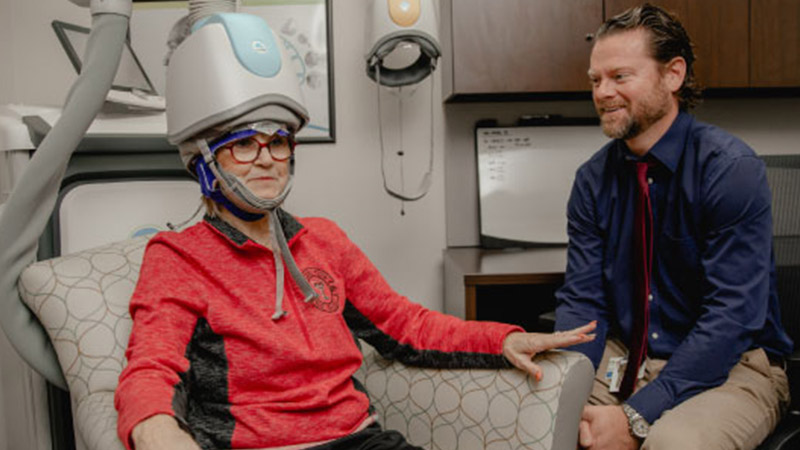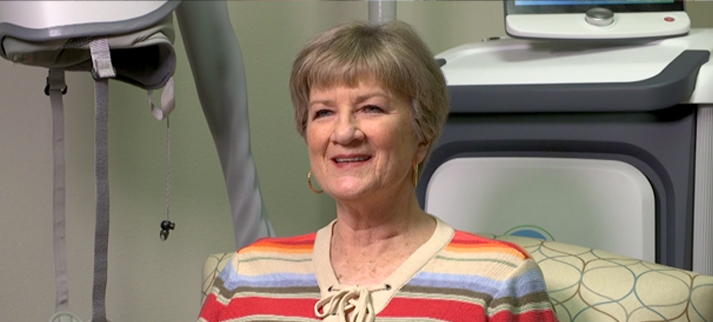
Deep Transcranial Magnetic Stimulation
What is Deep Transcranial Magnetic Stimulation (Deep TMS)?
Deep Transcranial Magnetic Stimulation (Deep TMS) is Relief From MDD and OCD, Without Medication.
Using FDA approved breakthrough technology, Deep TMS therapy is a non-invasive treatment for Major Depressive Disorder (MDD) and Obsessive Compulsive Disorder (OCD). Performed under a health care provider’s supervision, it does not require anesthesia or sedation. Patients are awake and alert during treatment sessions and are able to continue their lives as normal during treatment. Click here to fill out the Deep TMS Interest Form
Deep TMS Interest FormHow Does Deep TMS Work?
The BrainsWay Deep TMS technology uses a treatment coil to stimulate the neural activity of brain structures found to be related to MDD and OCD. The coil uses a magnetic field to deliver electric pulses to stimulate the neurons and improve the symptoms of OCD and MDD.
Why is it called Deep TMS?
BrainsWay’s unique coil design enables deeper and broader stimulation than traditional figure-8 TMS coils, resulting in greater activation of neurons, less likelihood of targeting errors, and high efficacy rates.
Is Deep TMS Right for Me?
33% of patients suffering with MDD are resistant to medication. 50% of patients suffering with OCD are resistant to current first-line treatment methods. Patients often discontinue medication due to side effects. Deep TMS therapy is well-tolerated, with no systemic side effects. In addition, patient suffering with MDD or OCD often need more than medication and psychotherapy to achieve remission. Deep TMS therapy is a well-tolerated alternative therapy or augmentation.
Sometimes, psychotherapy or cognitive therapy isn’t enough. Patients with severe MDD or OCD don’t always respond to evidence-based psychological treatments.
Deep TMS treatment is locally available and completed in an outpatient setting in short sessions, providing flexibility to patients’ schedules.
Contact Information
Ken Ritchie PA-C
TMS Clinic Director
Texas Tech University Health Sciences Center
School of Medicine
Psychiatry Dept
806.743.2800
Patient FAQs
How effective is Deep TMS?
Numerous clinical studies in reputable peer-reviewed journals have found that BrainsWay’s Deep TMS therapy is successful in alleviating symptoms of mental health conditions and offering patients relief.
Read the BrainsWay article.
Has Deep TMS therapy been tested?
The treatment available in West Texas uses BrainsWay Deep TMS technology, which has been tested in over 60 clinical studies, for various clinical indications, in leading institutions worldwide.
The FDA has approved BrainsWay Deep TMS therapy for treatment resistant depression and is also indicated by the FDA as an intended adjunct treatment for adult patients suffering from Obsessive Compulsive Disorder (OCD).
Are there safety concerns related to the Deep TMS treatment?
TMS treatment is a non-invasive procedure that has shown tolerability and real world usage. Before starting TMS, potential patients will have a consultation visit, where safety concerns will be addressed and discussed with a medical provider.
Does Deep TMS therapy have side effects?
The most common side effects are temporary, mild pain or discomfort in the area of the treatment site. About half of the patients receiving Deep TMS will complain of a headache. These side effects generally occur within the first week and typically resolve as treatment goes on.
Learn more about potential side effects here.
How long does the treatment take?
There are 36 treatment sessions total. Treatment is typically scheduled for 5 days a week for the first 6 weeks and the last 6 sessions are spread out over 2 additional weeks. The individual treatment sessions last approximately 20 minutes.
Will I need to stop medication?
No, Deep TMS is typically safe to combine with medications.
Where can I go to receive this treatment?
TMS therapy is conveniently located here in West Texas, at the Texas Tech University Health Sciences Center School of Medicine Department of Psychiatry.
Is TMS treatment covered by insurance?
Yes, most major insurance carriers, such as BCBS and Medicare, cover TMS treatment because it is effective and FDA approved.
Patients can contact our office for a TMS consultation visit to further discuss insurance reimbursement and payment options.
Treatment for OCD is only covered by BCBS at this time. Patients can contact our office for additional information and payment options.
Testimonials
Before Treatment
"My depressive symptoms, at their worst, I would stay in bed with my head covered
up and not do anything. I felt very exhausted all the time and had suicidal ideation
quite a bit.”
After BrainsWay OCD Treatment
“After my last treatment, I was very happy with the results. I was feeling hopeful
and I hadn’t felt that in so long. The suicidal ideation thoughts had decreased and
I really wasn’t thinking about it anymore by the end of the treatments.”
- Dana, MDD patient treated with BrainsWay MDD

Before Treatment
“In social situations I just wasn’t myself and didn’t know it… I wasn’t well. I was
extremely nervous, repetitive and couldn’t sleep.”
After BrainsWay OCD Treatment
“I have never experienced anything like that… it was miraculous… I feel like a new
person. I regained my confidence.”
- Cathy, OCD patient treated with BrainsWay OCD